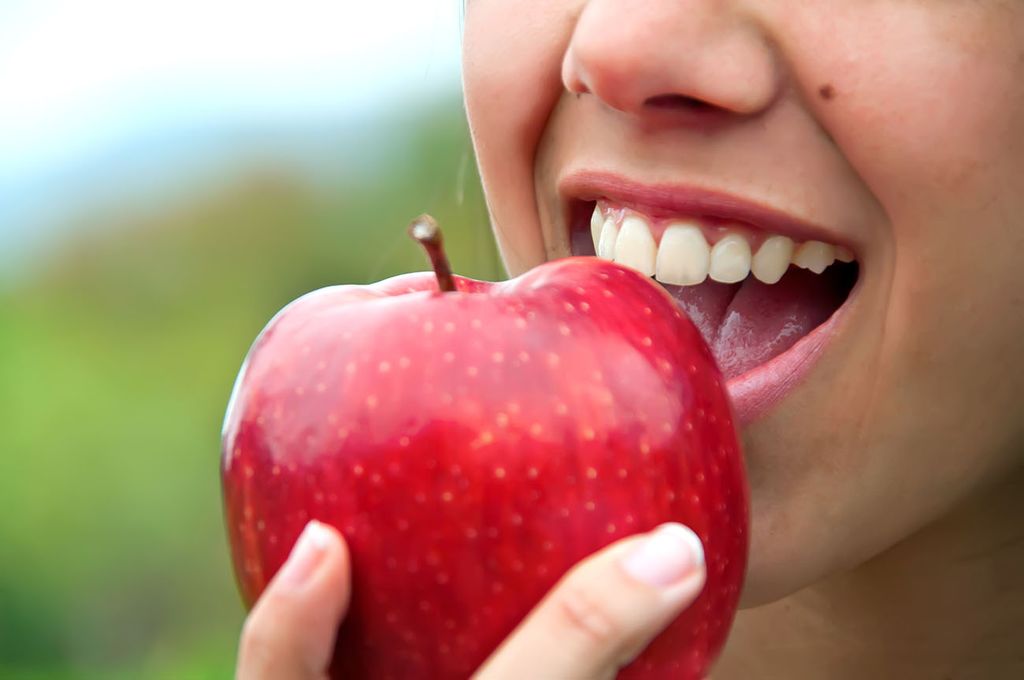You’ve probably heard the saying, “You are what you eat.” What you put into your body doesn’t just affect your overall health. It also plays a role in your gum health. Your gums are the connective tissue that holds your teeth in place. Gum infections can lead to serious problems for your teeth and mouth.
The good news is that you can help prevent gum disease and other oral health issues by eating a balanced diet. Certain foods are especially great for your gums, so adding them to your meals can make a great difference. Let’s look at four foods that can boost your gum health and keep your smile in great shape.

1. Apples
If you’re craving something sweet, apples are a much better choice than sugary or acidic snacks. Not only are they good for your teeth, but they’re also great for your gums.
When you bite into an apple, the tough skin helps scrub away plaque and food particles from your teeth as you chew. This helps your mouth stay cleaner and reduces the amount of bacteria hanging around. Since too much bacteria can lead to gum infections, eating apples can lower your risk of gum disease. Plus, they’re crunchy and delicious so what’s not to love?
2. Yogurt
Dairy products like yogurt are packed with calcium, which is great for strengthening your teeth. But yogurt has an extra benefit for your gums: it contains probiotics.
Probiotics are “good” bacteria that help balance the bacteria in your mouth and body. When the bacteria in your mouth are balanced, it’s harder for harmful bacteria to cause infections and gum disease. So, adding yogurt to your diet can help your gums and your smile.
3. Salmon
Salmon and other oily fish are rich in omega-3 fatty acids. These acids are known for their anti-inflammatory properties. Gum disease causes inflammation in your gums and cause symptoms like swelling, bleeding, and soreness.
Eating salmon can help reduce this inflammation and ease some of the discomfort from gum disease. While salmon can help with symptoms, it’s important to remember that it won’t cure gum disease on its own. You’ll still need to see your dentist for treatment.
4. Water
Okay, water isn’t technically a food. But it’s still one of the best things you can consume for your gum health! Drinking water helps rinse away food particles and bacteria from your teeth. This can prevent plaque buildup and lower your risk of gum disease.
Staying hydrated also helps prevent dry mouth, a condition where your mouth doesn’t produce enough saliva. Dry mouth can make it easier for bacteria to spread and increase your chances of gum problems. So make sure you’re drinking plenty of water throughout the day to keep your mouth healthy and hydrated.
Why Gum Health Matters
Your gums are the foundation of your smile, so keeping them healthy is super important. Gum disease doesn’t just cause pain and discomfort. It can also lead to tooth loss and other serious health issues if you don’t treat it. By eating the right foods and practicing good oral hygiene, you can protect your gums and keep your smile strong.
Tips for Healthy Gums
- Brush and Floss Daily: Brush your teeth twice a day and floss at least once to remove plaque and bacteria.
- Visit Your Dentist: Regular checkups and cleanings can help catch gum problems early.
- Eat a Balanced Diet: Include plenty of fruits, vegetables, lean proteins, and dairy in your meals.
- Stay Hydrated: Drink water throughout the day to keep your mouth clean and moist.
By adding these four foods to your diet and following these tips, you can give your gums the care they deserve. If you have questions about gum health or need a checkup, don’t hesitate to reach out to Integrated Dental of Florida at 941-270-9755. A healthy smile starts with healthy gums!
